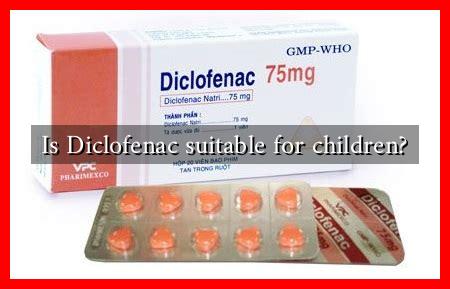-
Table of Contents
Is Diclofenac Suitable for Children?
Diclofenac is a non-steroidal anti-inflammatory drug (NSAID) commonly used to relieve pain, reduce inflammation, and lower fever. While it is widely prescribed for adults, its use in children raises important questions regarding safety and efficacy. This article explores the suitability of diclofenac for pediatric patients, examining its benefits, risks, and alternative treatments.
Understanding Diclofenac
Diclofenac works by inhibiting enzymes involved in the production of prostaglandins, which are chemicals in the body that promote inflammation, pain, and fever. It is available in various forms, including oral tablets, topical gels, and injections. Common conditions treated with diclofenac include:
- Arthritis
- Musculoskeletal pain
- Post-operative pain
- Menstrual pain
Diclofenac Use in Children
The use of diclofenac in children is not as straightforward as in adults. While some studies suggest that it can be effective for treating certain conditions in pediatric patients, there are significant concerns regarding its safety profile.
Age Considerations
Diclofenac is generally not recommended for children under the age of 14. For older children and adolescents, it may be prescribed in specific situations, but only under strict medical supervision. The American Academy of Pediatrics advises caution when using NSAIDs in children, particularly due to the potential for adverse effects.
Potential Risks
Several studies have highlighted the risks associated with diclofenac use in children:
- Gastrointestinal Issues: NSAIDs, including diclofenac, can cause gastrointestinal bleeding and ulcers, which may be more pronounced in children.
- Kidney Damage: There is a risk of acute kidney injury, especially in dehydrated children or those with pre-existing kidney conditions.
- Cardiovascular Risks: Long-term use of diclofenac has been associated with an increased risk of heart attack and stroke, raising concerns for pediatric patients with underlying health issues.
Case Studies and Research Findings
A study published in the journal *Pediatrics* examined the use of diclofenac in children with postoperative pain. The researchers found that while diclofenac was effective in managing pain, the incidence of side effects was notable, leading to recommendations for careful monitoring and consideration of alternative medications.
Another research article in *The Journal of Pain Research* indicated that while diclofenac can be effective for treating juvenile idiopathic arthritis, it should be used with caution, and alternative treatments such as acetaminophen or ibuprofen may be safer options for managing pain in children.
Alternatives to Diclofenac
Given the potential risks associated with diclofenac, healthcare providers often consider alternative treatments for managing pain and inflammation in children. Some safer options include:
- Acetaminophen: Often recommended for mild to moderate pain and fever, acetaminophen has a favorable safety profile in children.
- Ibuprofen: Another NSAID that is commonly used in pediatrics, ibuprofen is generally considered safer than diclofenac for short-term use.
- Physical Therapy: For chronic pain conditions, physical therapy can provide non-pharmacological relief.
Conclusion
In summary, while diclofenac can be effective for certain conditions in older children and adolescents, its use must be approached with caution due to potential risks. Healthcare providers should carefully weigh the benefits against the risks and consider safer alternatives whenever possible. Parents and caregivers should always consult with a pediatrician before administering any medication to children, ensuring that the chosen treatment aligns with the child’s specific health needs.
For more information on pediatric medication safety, you can visit the American Academy of Pediatrics.

